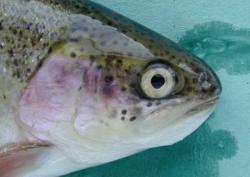British Scientists Find Cure For Cataracts In Salmon
September 30, 2010 | 1 min to read

Norfolk scientists have delivered a big boost to a $11bn worldwide industry after identifying a key nutrient that prevents cataracts in salmon.
Norwich Eye Research Group at the University of East Anglia (UEA) has shown how the nutrient histidine, when added to the diet of farmed salmon, prevents the eye condition from developing.
The research is published today in the American Journal of Physiology – Regulatory, Integrative and Comparative Physiology.
Following fears over BSE in the early 1990s, blood meal was removed from the diet of farmed salmon. This coincided with a large increase in the incidence of cataracts, which cause economic losses and fish welfare problems.
Lead author Dr Jeremy Rhodes said: “The international research team of which we are a part has identified a key nutrient (histidine) that is present in high quantities in blood meal but was deficient in the post 1990s diet. We also found that by adding histidine to the salmon’s diet, cataracts could be prevented.
To read the rest of the story, please go to: Norwich Evening News 24 (Norwich, U.K.).
